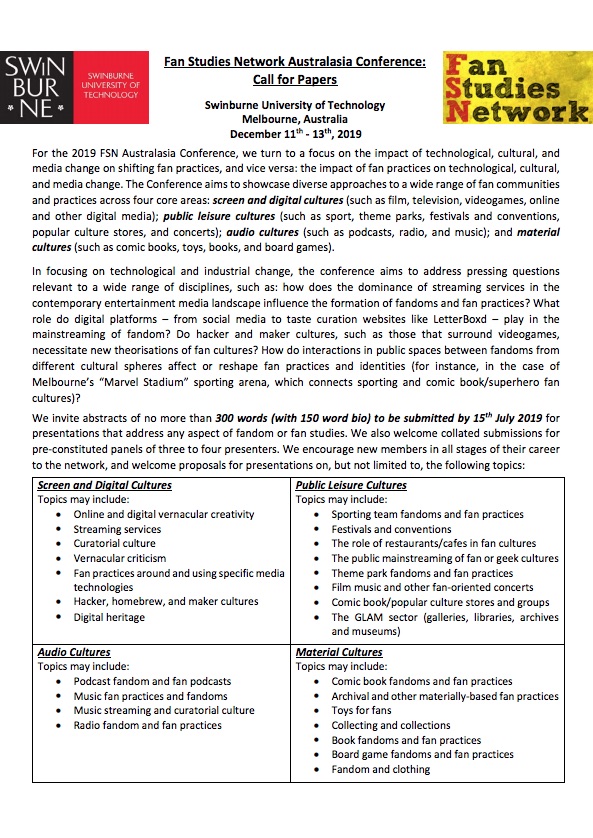
Fan Studies Network Australasia Conference: Call for Papers
Swinburne University of Technology Melbourne, Australia December 11th - 13th, 2019
For the 2019 FSN Australasia Conference, we turn to a focus on the impact of technological, cultural, and media change on shifting fan practices, and vice versa: the impact of fan practices on technological, cultural, and media change. The Conference aims to showcase diverse approaches to a wide range of fan communities and practices across four core areas: screen and digital cultures (such as film, television, videogames, online and other digital media); public leisure cultures (such as sport, theme parks, festivals and conventions, popular culture stores, and concerts); audio cultures (such as podcasts, radio, and music); and material cultures (such as comic books, toys, books, and board games).
In focusing on technological and industrial change, the conference aims to address pressing questions relevant to a wide range of disciplines, such as: how does the dominance of streaming services in the contemporary entertainment media landscape influence the formation of fandoms and fan practices? What role do digital platforms – from social media to taste curation websites like LetterBoxd – play in the mainstreaming of fandom? Do hacker and maker cultures, such as those that surround videogames, necessitate new theorisations of fan cultures?
How do interactions in public spaces between fandoms from different cultural spheres affect or reshape fan practices and identities (for instance, in the case of Melbourne’s “Marvel Stadium” sporting arena, which connects sporting and comic book/superhero fan cultures)? We invite abstracts of no more than 300 words (with 150 word bio) to be submitted by 15th July 2019 for presentations that address any aspect of fandom or fan studies. We also welcome collated submissions for pre-constituted panels of three to four presenters. We encourage new members in all stages of their career to the network, and welcome proposals for presentations on, but not limited to, the following topics:
Screen and Digital Cultures Topics may include: • Online and digital vernacular creativity • Streaming services
• Curatorial culture • Vernacular criticism • Fan practices around and using specific media technologies
• Hacker, homebrew, and maker cultures
Digital heritage Public Leisure Cultures Topics may include: • Sporting team fandoms and fan practices
• Festivals and conventions • The role of restaurants/cafes in fan cultures • The public mainstreaming of fan or geek cultures
• Theme park fandoms and fan practices • Film music and other fan-oriented concerts • Comic book/popular culture stores
and groups • The GLAM sector (galleries, libraries, archives and museums)
Audio Cultures Topics may include: • Podcast fandom and fan podcasts • Music fan practices and fandoms
• Music streaming and curatorial culture • Radio fandom and fan practices
Material Cultures Topics may include: • Comic book fandoms and fan practices • Archival and other materially-based fan
practices • Toys for fans • Collecting and collections • Book fandoms and fan practices • Board game fandoms and fan
practices • Fandom and clothing
Across all of these areas, papers are welcome that approach issues such as audience research and fan studies methodologies; accessibility of fan cultures and fan studies; anti-fandom and toxic practices; fan labour; transcultural and transnational fandom; fan/industry relationships (subversions, interactions, appropriations); inter-generational fandoms and fan practices; the ethics of studying participatory culture and fandom; transgressive fan practices and fandoms (ie alt-right and serial killer fan cultures); shipping, slash fiction, and other queer fan practices; and the intersections between media/industry change and shifting fan practices.
The conference will feature a number of innovative keynote speakers who have driven fan studies in new directions across a range of different disciplines. These include the following keynote speakers, with further speakers and industry events to be announced:
Dr Bertha Chin
Lecturer of Social Media and Communication Swinburne University of Technology, Sarawak,
Malaysia Editor: Crowdfunding the Future: Media Industries, Ethics, and Digital Society (with Lucy Bennett & Bethan Jones, 2015)
Editor: Crowdfunding Issue of New Media and Society (with Bennett and Jones, 2015)
Editor: Transcultural Issue of Participations: Journal of Audience and Reception Studies (with Lori Morimoto, 2015).
Dr Suzanne Scott
Assistant Professor, Department of Radio-Television-Film The University of Texas at Austin Author: Fake Geek Girls: Fandom, Gender, and the Convergence Culture Industry (2019)
Editor: The Routledge Companion to Media Fandom (with Melissa A. Click, 2018)
Editor: In Focus: Gender Identity and Representation in the Superhero Genre Issue of Cinema Journal (with Ellen Kirkpatrick, 2015).
Professor Melanie Swalwell
Professor of Digital Media Heritage Swinburne University of Technology, Melbourne, Australia
Editor: Fans and Videogames: Histories, Fandoms, Archives (with Angela Ndalianis and Helen Stuckey, 2017)
Editor: Born Digital Cultural Heritage Issue of Refractory: A Journal of Entertainment Media (with Angela Ndalianis, 2016) Lead Investigator of the digital heritage project “Play it Again: Creating a Playable History of Australasian Digital Games” in collaboration with the Australian Centre of the Moving Image.
Dr Benjamin Woo
Assistant Professor, School of Journalism and Communication Carleton University, Ottawa, Canada
Author: Getting a Life: The Social Worlds of Geek Culture (2018)
Author: The Greatest Comic Book of All Time: Symbolic Capital and the Field of American Comic Books (with Bart Beaty, 2016)
Editor: Scene Thinking: Cultural Studies from the Scenes Perspective (with Stuart Poyntz and Jamie Rennie, 2016).
Please send a 300 word abstract and a 150 word bio by the 15th of July as a word doc attachment to the conference organising committee: jbalanzategui@swin.edu.au.
Use the Subject Line: “Abstract Submission FSNA2019” and the following the file name convention: Surname_Proposal
Title Conference Steering Committee: Dr Jessica Balanzategui (jbalanzategui@swin.edu.au) Dr Liam Burke Taylor Hardwick Dr Naja Later Tara Lomax Andy Lynch Professor Angela Ndalianis

